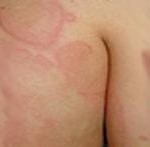 If your skin itchy, it stretches, is red or irritated and uncomfortable with any change in temperature, food or no apparent reason, it is time to visit a dermatologist.
If your skin itchy, it stretches, is red or irritated and uncomfortable with any change in temperature, food or no apparent reason, it is time to visit a dermatologist.
Skin sensitivity is one of the five leading causes of dermatological consultation.
A truly sensitive skin is characterized by an excessive reaction to factors that are well tolerated by most people.
“The result of this reaction is the tightness, discomfort, redness, swelling and burning, that occur when skin is exposed to cold, heat, pollution or certain cosmetics, even when certain foods are consumed, says Rodrigo Gutierrez Bravo dermatologist.
This hyper-reactivity is not allergic origin, but is related to the irritability of the nerve endings found in the upper layers of the epidermis. “Dermatologists consider that 44% of the population has sensitive skin, which is divided into: mild, moderate and severe.
“The end we know disease such as atopic dermatitis or neurodermatitis: skin prone to dryness and which should be very careful and not be exposed to temperature changes, avoid contact with certain cosmetic substances.”
Identify your group
Basically, there are four groups of factors which cause skin hypersensitivity.
• Environmental: When skin is inflamed, red, dry and burn to heat, cold, wind and sudden temperature changes.
• Contact: Occurs when skin is exposed to certain products: mineral water, some cosmetics, and certain types of tissues.
• Vascular: It is related to the fragility of the arterial walls of the epidermis, which are altered by factors both internal (spicy foods or alcohol) and external (thermal shock).
• Atopic: It’s the one with alteration in all circumstances. It is the most sensitive skin types.
In all cases, warns a dermatologist, there is genetic predisposition and also the patient may be placed in one, two or four groups of factors which cause the overactive skin. “It is therefore important to ask in consultation family history and habits, in order to prescribe appropriate treatment,” he said.



